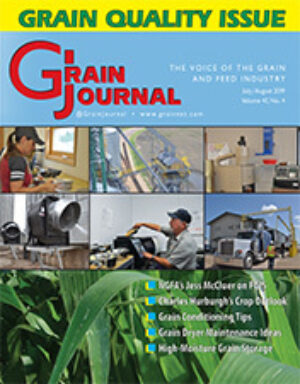Why I Believe In
NGFA Arbitration System Provides Fair Way to Handle Industry Disputes
National Grain & Feed Association (NGFA) • 202-289-0873 • http://www.ngfa.org

System provides inexpensive, accessible, expeditious, and user-friendly alternative to litigation
Dennis Inman | Vice President-Grain | CFS Coop | Truman, MN
“Over the course of my 40-year-career, I’ve been both a plaintiff and defendant. I’ve also had the privilege of serving on several arbitration panels, including two different oral hearings.
As a plaintiff, the disputes were primarily producer forward contract defaults, most of which included unique pricing features combined with significant market moves that lead to the defaults.
“As an arbitrator, several of the cases were similar to what I experienced as a plaintiff. As an arbitrator, it took consideration of the trade rules but also putting yourself into the shoes of both the plaintiff and the defendant to sort out what happened beyond what was clear from the actual contract. Another takeaway was not who won or lost but how the damages were calculated. In some cases, the timing of when the actual default occurred and when the contract was cancelled came into question when calculating damages.
“One of the most positive impacts is that NGFA publishes all of the decisions. When I first began my career in the grain industry, I read though dozens of cases and was really able to learn not only about the actual trade rules but also some of the common situations that lead to the disputes. I learned a lot about the value of clear communication, prompt follow up, good documentation, and other good business practices that can head off disputes before they happen. I still read every decision and continue to learn from them.
“Problems and disputes can and do arise, but the NGFA Arbitration System has proven many times to be a fair, quick, and cost-effective way to resolve the issues.”
Steve D. Young | Merchandiser | CHS Grainland | Holyoke, CO
“I have arbitrated three or four written cases and also been involved as an arbitrator in an oral hearing for the NGFA Arbitration System.
“Obviously, in each case I have been involved with, someone was happy with the result and someone was not. But the great advantage of this system is that the dispute is decided by people who understand the industry and how things work in our businesses. Going into a court room to decide these cases would require much more time and effort by both parties to either get judges and/or jurors acquainted with terms, processes, and trade rules before they could begin to make any judgment on the case. Even with that time spent, there still would be misunderstandings and lack of comprehension of how the grain and feed industry works.
“By using fellow industry members, they already understand the basics of our industry and can look into the details of the dispute to reach a decision based on their experience and understanding of the history of the industry.”
Sharon Clark | Senior Vice President-Transportation & Regulatory Affairs | Perdue Agribusiness | Salisbury, MD
“I have been an arbitrator on seven NGFA arbitration cases since the early ‘90s. I was a member of the task force of railroad and shipper members charged with developing the first NGFA Rail Arbitration and Mediation Rules. Since 1999, I have been a member of the NGFA Rail Arbitration Rules Committee and have been a member of the Arbitration Appeals Panel since 2010. I also was named chair of the Arbitration Appeals Panel in 2017.
“NGFA arbitration definitely is a fair way to handle disputes within the industry. In 2006-07, NGFA commissioned a report to explore the advantages and disadvantages of the NGFA Arbitration System compared to the two most prominent forums available for resolving commercial disputes – the courts and general commercial arbitration tribunals. The report showed that the NGFA system is the most highly developed and sophisticated of the trade association-run systems, and that it is superior to both general commercial arbitration and litigation in state and federal court for resolving commercial disputes among industry members.
“The way the system is structured ensures it is well run and adaptable to market conditions and other challenges. The NGFA rules creation and amendment process is designed to be widely inclusive, with the interests of firms of different sizes and regions being amply represented. Over the years, I think NGFA has struck a successful balance between amending the trade rules in response to new circumstances and the arbitrators’ experience applying them.”
Reprinted from Grain Journal July/August 2019 Issue
About National Grain & Feed Association (NGFA)
Washington, DC202-289-0873
http://www.ngfa.org
In This Issue

Grain Journal July August 2019
View this case study and more in the Grain Journal July August 2019 magazine.
Related Articles
- Mid-Continent Industries Newton Grain Cleaner
Mid-Continent Industries, Inc. - CCS Group Using Raken App to Streamline Construction Field Updates
CCS Group, LLC - EXTRON AgTECT Grain Spreader Uses Gravity-Powered Design
EXTRON AgTECT - IAOM Provides Educational and Networking Opportunities to Advance Careers and the Milling Industry
International Association of Operative Millers (IAOM) - Grain Elevator and Processing Society Allows Grain Professionals to Network
Grain Elevator & Processing Society (GEAPS) - Grain Rescue Tube Designed For Quick, Safe Rescues
KC Supply Co. Inc. - NGFA Arbitration System Provides Fair Way to Handle Industry Disputes
National Grain & Feed Association (NGFA) - NGFA Committee Apprentice Program Allows Participants To Develop Skills, Career
National Grain & Feed Association (NGFA) - Grain Elevator and Processing Society Finds Next Generation of Industry Leaders
Grain Elevator & Processing Society (GEAPS) - National Grain and Feed Association Allows Professionals to Share Knowledge and Information
National Grain & Feed Association (NGFA)